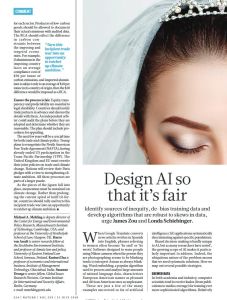Join getAbstract to access the summary!

Join getAbstract to access the summary!
James Zou and Londa Schiebinger
Design AI so that it’s Fair
Identify sources of inequity, de-bias training data and develop algorithms that are robust to skews in data, urge James Zou and Londa Schiebinger.
Nature, 2018
What's inside?
Scientists and ethicists discuss how to mitigate gender, race and ethnic biases in AI systems.
Recommendation
Identifying intrinsic biases toward gender, race and culture in artificial intelligence systems requires a structured analysis of data collection and machine learning, and of how results are parsed by humans. AI-supported decisions by government, corporations and scholars can be unintentionally tainted by such inequities. In a detailed report citing numerous real-world examples, James Zou and Londa Schiebinger offer solid suggestions about how to adjust AI algorithms, aiming for fairness to millions who may be affected. The article is required reading for anyone involved in business and policy decisions, and concerned by the ethics of AI systems.
Summary
About the Authors
James Zou is assistant professor of biomedical data science and (by courtesy) of computer science and electrical engineering, Stanford University. Londa Schiebinger is the John L. Hinds Professor of History of Science and director of Gendered Innovations in Science, Health & Medicine, Engineering, and Environment, Stanford University.





















Comment on this summary